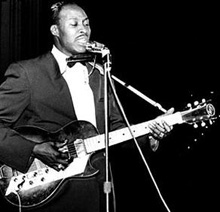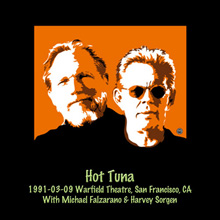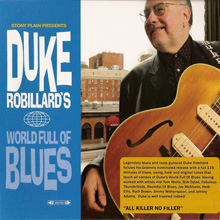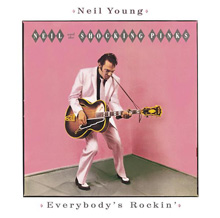Bright Lights, Big City
 |
When it comes to jam vehicles, nothing will get you there faster or in greater comfort than a simple 12-bar blues. Every guitarist should carry several in their emergency jam-repair kit. Truth is, you could survive most common repertoire malfunctions with just a few chestnuts from a single blues composer: Jimmy Reed.
Reed is the patron saint of mere-mortal musicians. Your voice is better than his. You play guitar better then he did. And though his life story has some superficially attractive elements of fantasy to it—between 1956 and 1963 he was a consistent presence on the US R&B charts—you are almost certainly living a happier life than his, ravaged as it was by alchoholism and epilepsy.
But if Reed made any number of simple things look really hard, he made one really hard thing look easy: writing accessible, memorable, instantly recognizable, brilliant songs. Songs that, as Cub Koda puts it in his bio of Reed at allmusic.com,
...have become such an integral part of the standard blues repertoire, it's almost as if they have existed forever. Because his style was simple and easily imitated, his songs were accessible to just about everyone from high-school garage bands having a go at it, to Elvis Presley, Charlie Rich, Lou Rawls, Hank Williams, Jr., and the Rolling Stones, making him -- in the long run -- perhaps the most influential bluesman of all.
So go ahead, invoke Saint Jimmy's support and succor whenever you are feeling like you just haven't got what it takes to be a musician. It doesn't require particularly fleet fingers, or a wide vocal range, or a vast repertoire. All it really takes is that you step up to the mic—an imaginary one will do—and sing and play your heart out, as you hear Jimmy doing on this first audio clip below. It does help a lot, though, if two other pieces are in place. One, it's good to have the support of friends who know where to find the beat when you lose it. On that score, Jimmy had his wife Mary (Mama) Reed and his old friend and sideman Eddie Taylor, both of whom you hear on this track. The other piece is a great, simple song. Like this one.
Audio Clip: Jimmy Reed with Mama Reed and Eddie Taylor, Bright Lights, Big City, 1961
 |
White boys love to cover Jimmy Reed tunes. My theory is that this is owing to the fact that his songs have actual melodies, which means you don't have to be able to scream, growl, shout or soar vocally to put the song across. You have the option of singing it. The same option exists for white girls, too, so here are two cuts, one per gender to make the point. On the boys team we have live Hot Tuna, vintage 1991. Stepping up to the plate for the ladies, we welcome someone I'd never heard of, one Arielle Verinis, who, truth be told, sounds as if she could do as much vocal soaring as this or most any blues song required. She offers the tune up as part of a Jimmy Reed medley (paired with another JR standard that is in our CG repertoire, Baby What You Want Me To Do) in a hip, up-tempo, jump-blues style, horn section a-blaring. Pure fun and—women vocalists, take note—in the same key as we play it (A).
Audio Clip: Hot Tuna, Live at the Warfield Theater, San Francisco, 1991
Audio Clip: Arielle Verinis, from her Chess EP, Vol. 2
 |
Like those horns? OK, here are some more, this time from Duke Robillard who is probably best known for his work with the horn-happy outfit he co-founded in 1967, Roomful of Blues. This arrangement provides some simple lessons on how you can lend a jazzier harmony to a straight 12-bar blues. Start by noting that they are playing the tune in Ab. (Horns....love those flat keys.) Now listen in the opening vamp for the very first note played on the sax. Got it? F natural, right? So what's that over an Ab chord? It's the 6th scale degree, which in the context of a dominant 7th chord gives you a 13th. So, that's lesson 1 on Quick Hip: try adding a 6th/13th to your 7th chords. Now, do as Duke does and scootch that Ab13th chord up a half step to A13, rinse and repeat, back and forth. Do the same thing on the IV chord: Db7 to D7. Nice little device, that. Flesh out the progression with a I-VI-ii-V (Ab-F7-Bbm7-Eb7) in the last several bars and Jimmy Reed is sounding just a little like Jimmy Van Heusen.
Audio Clip: Duke Robillard lends sophisticated airs to Bright Lights, Big City
 |
This last one is just for fun. People are always telling me we should do some Neil Young songs. I don't think this is exactly what they have in mind. But, can I get credit anyway?
All Community Guitar Resources text & material © 2006 Andrew Lawrence
